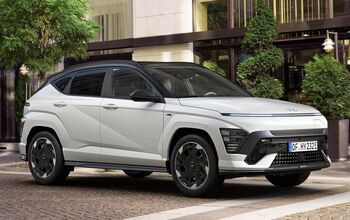Battery Prices Likely Heading for the Ceiling After Congo Raises Royalty Rate

The Democratic Republic of Congo has declared cobalt a “strategic” substance, nearly tripling the royalty rate miners will have to pay on it. According to a governmental decree, miners will now pay 10 percent in royalties to extract the element.
While we’ve previously warned of the likelihood of a global supply shortage elevating the price of batteries, it seems this will occur only after the Congo taxes the crap out of it. This is the second time cobalt has seen a royalty hike since June, when the region increased the previous 2 percent royalty to 3.5 percent.
Besides the looming prospect of a reversal in the falling price of EV batteries, a spike in the price of cobalt is already ruffling some feathers.
According to Reuters, Congolese Prime Minister Bruno Tshibala signed the decree late last month despite fierce opposition from leading investors. Both Glencore and China Molybdenum have lobbied against mineral tax hikes under a new mining code adopted earlier this year.
As the region is responsible for more than 60 percent of the world’s cobalt production, even minor changes can seriously influence the final cost of batteries. Foreign investors have claimed tax hikes under the new code will hamper further investment and have threatened to challenge some parts of the Congo’s new regulations in arbitration.
While this will no doubt impact the price of electric vehicles, a temporary cobalt surplus has managed to keep prices down through the second half of 2018. This surplus is expected to decline sharply as EV adoption continues and mines begin to scramble to meet demand. Most analysts expect to see cobalt trading at record prices again by 2020 and continue upward from there. The increase in royalties really only serves to accelerate the timeline.

A staunch consumer advocate tracking industry trends and regulation. Before joining TTAC, Matt spent a decade working for marketing and research firms based in NYC. Clients included several of the world’s largest automakers, global tire brands, and aftermarket part suppliers. Dissatisfied with the corporate world and resentful of having to wear suits everyday, he pivoted to writing about cars. Since then, that man has become an ardent supporter of the right-to-repair movement, been interviewed on the auto industry by national radio broadcasts, driven more rental cars than anyone ever should, participated in amateur rallying events, and received the requisite minimum training as sanctioned by the SCCA. Handy with a wrench, Matt grew up surrounded by Detroit auto workers and managed to get a pizza delivery job before he was legally eligible. He later found himself driving box trucks through Manhattan, guaranteeing future sympathy for actual truckers. He continues to conduct research pertaining to the automotive sector as an independent contractor and has since moved back to his native Michigan, closer to where the cars are born. A contrarian, Matt claims to prefer understeer — stating that front and all-wheel drive vehicles cater best to his driving style.
More by Matt Posky
Latest Car Reviews
Read moreLatest Product Reviews
Read moreRecent Comments
- Probert They already have hybrids, but these won't ever be them as they are built on the modular E-GMP skateboard.
- Justin You guys still looking for that sportbak? I just saw one on the Facebook marketplace in Arizona
- 28-Cars-Later I cannot remember what happens now, but there are whiteblocks in this period which develop a "tick" like sound which indicates they are toast (maybe head gasket?). Ten or so years ago I looked at an '03 or '04 S60 (I forget why) and I brought my Volvo indy along to tell me if it was worth my time - it ticked and that's when I learned this. This XC90 is probably worth about $300 as it sits, not kidding, and it will cost you conservatively $2500 for an engine swap (all the ones I see on car-part.com have north of 130K miles starting at $1,100 and that's not including freight to a shop, shop labor, other internals to do such as timing belt while engine out etc).
- 28-Cars-Later Ford reported it lost $132,000 for each of its 10,000 electric vehicles sold in the first quarter of 2024, according to CNN. The sales were down 20 percent from the first quarter of 2023 and would “drag down earnings for the company overall.”The losses include “hundreds of millions being spent on research and development of the next generation of EVs for Ford. Those investments are years away from paying off.” [if they ever are recouped] Ford is the only major carmaker breaking out EV numbers by themselves. But other marques likely suffer similar losses. https://www.zerohedge.com/political/fords-120000-loss-vehicle-shows-california-ev-goals-are-impossible Given these facts, how did Tesla ever produce anything in volume let alone profit?
- AZFelix Let's forego all of this dilly-dallying with autonomous cars and cut right to the chase and the only real solution.


































Comments
Join the conversation
Old price: X*1.035 (where X is the "base price" the royalties are on). New price: X*1.10. An increase of 6.5% on cobalt should not make battery prices "head for the ceiling". The first source I could find (https://qnovo.com/82-the-cost-components-of-a-battery/) suggests that the cobalt used in li-ion cathodes costs $10-15 per kWH before this increase. $15 + 6.5% = ... just under $16. A dollar per kWH.
Thank you for doing the math! So the price of a Chevy Bolt goes up $60. Sixty dollars, you say? Why, that's straight through the ceiling, I tell you!